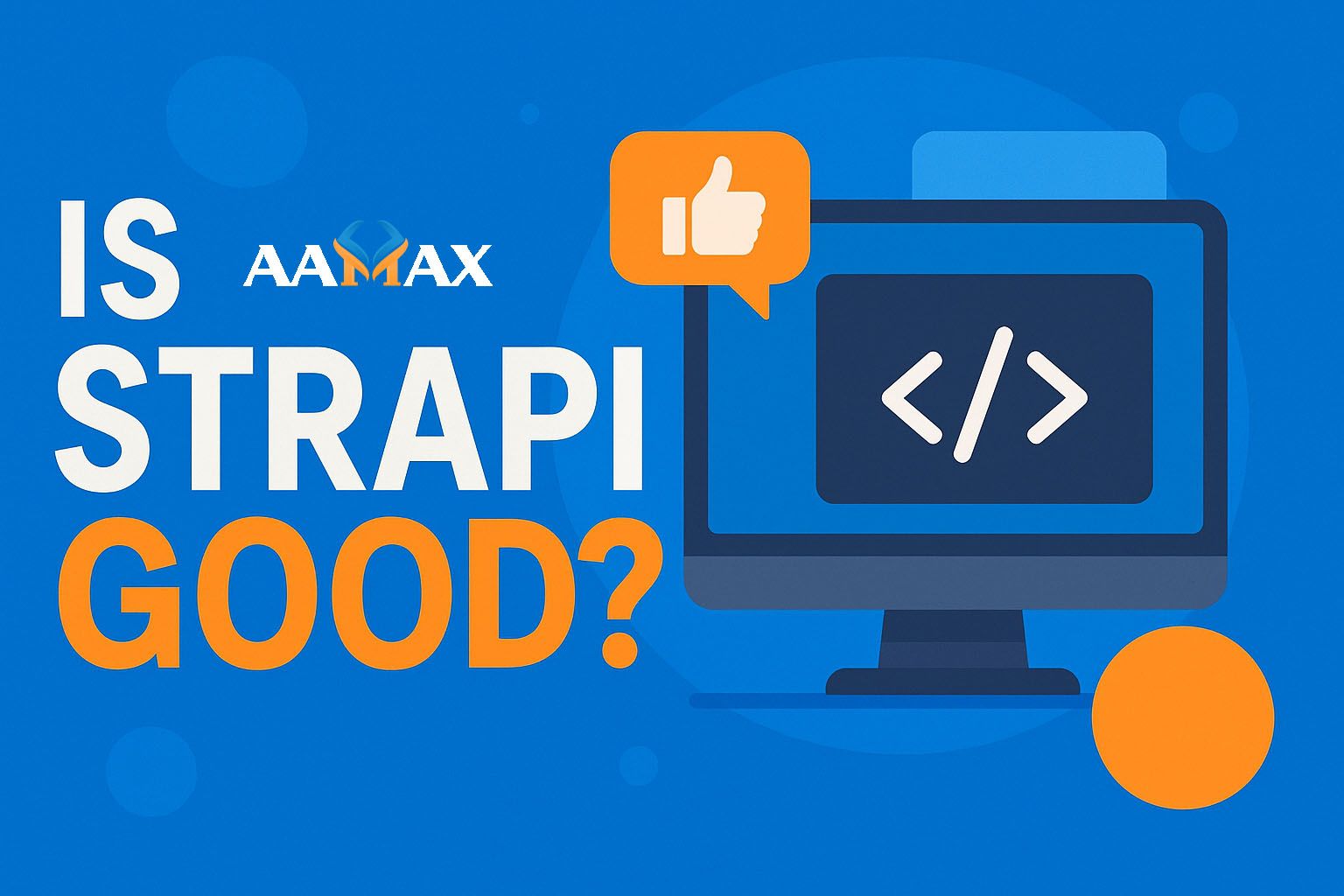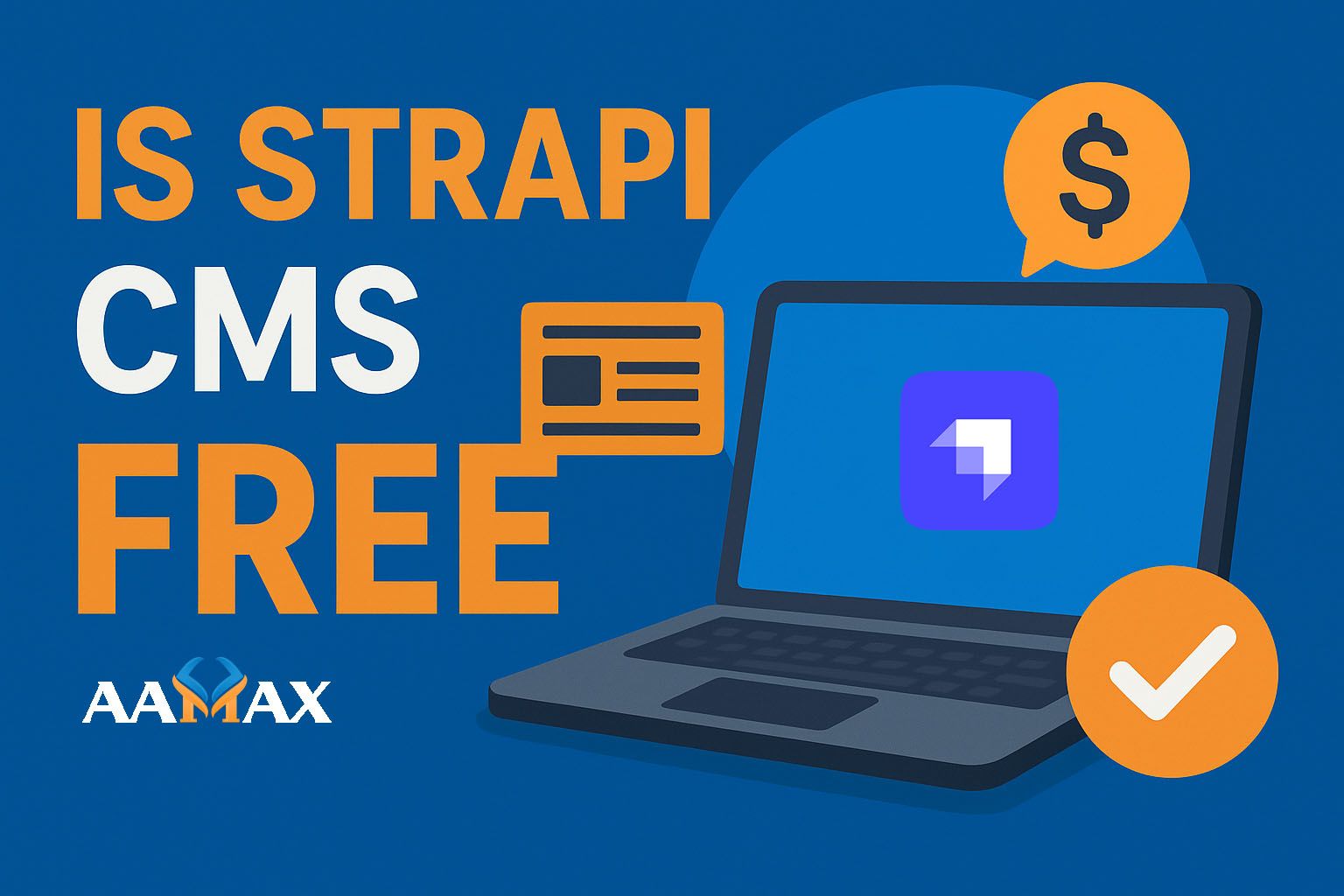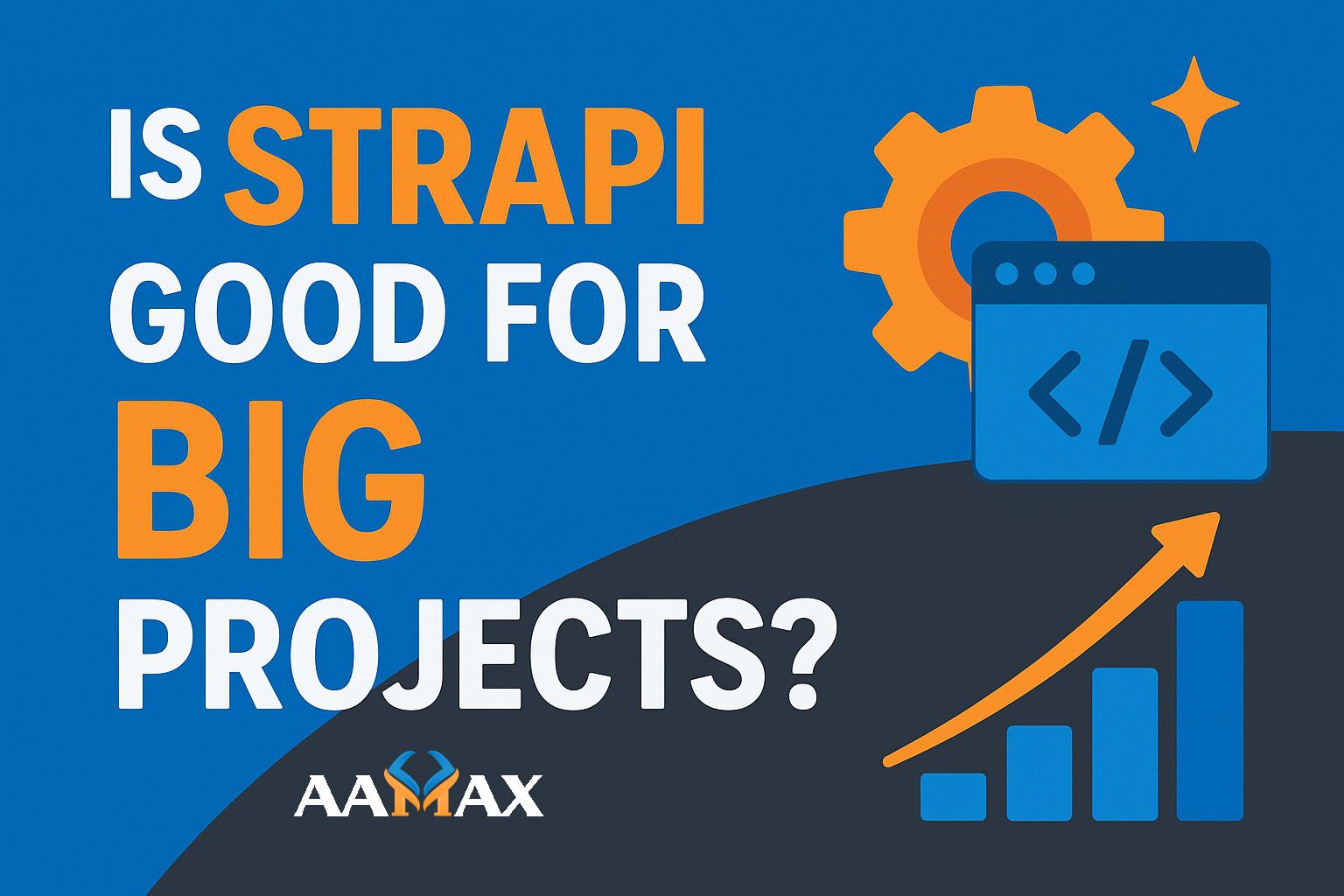
Is Strapi Good
Strapi has become one of the most widely adopted headless CMS platforms in the world, praised for its flexibility, developer-first approach, and open-source foundation. But the big question many businesses and developers ask is: Is Strapi good? Does it deliver real value, scalability, and performance for modern web applications?
This article is written for the AAMAX blog. AAMAX is a full-service digital marketing agency offering Web Development, SEO, Digital Marketing, and MERN Stack Development Services If you're building a Strapi-powered application and need expert help, you can hire AAMAX to bring your project to life.
What Is Strapi and Why Is It Popular?
Strapi is an open-source headless CMS built with Node.js. It gives you a highly flexible backend that exposes content via REST or GraphQL APIs to any frontend---React, Next.js, Vue, Angular, mobile apps, and more.
What makes Strapi stand out in the crowded CMS market is its modern, API-driven architecture combined with the power of full customization. Unlike traditional CMS platforms such as WordPress, Joomla, or Drupal, Strapi doesn't dictate how your frontend looks or behaves. It only manages content and delivers it through clean, developer-friendly APIs.
Key Reasons Strapi Is Popular
- Developer-first design\
- Fully customizable content types\
- Open-source and self-hosted\
- Works seamlessly with modern frontend frameworks\
- Fast performance and scalability\
- Strong plugin ecosystem\
- Easy-to-use admin dashboard\
- Rich documentation\
- Community support and commercial support options
Now let's dive deeper into what makes Strapi good---and when it may not be the best option.
Is Strapi Good for Modern Web Development?
The short answer: Yes---Strapi is extremely good for modern, API-based
development.
But why?
1. A True Headless CMS
Strapi was built as headless from day one. That means:
- No rigid themes\
- No frontend dependency\
- Content is delivered via clean APIs\
- You can build frontends using any technology
For developers working on JAMstack, React, Next.js, or mobile apps, Strapi is one of the most flexible CMS choices available.
2. Open-Source and Free
One of the biggest reasons Strapi is highly recommended is its MIT
open-source license.
You can:
- Use it commercially\
- Modify the source\
- Extend it\
- Self-host it\
- Build custom features
This gives businesses full control over their content infrastructure.
3. Easy Admin Dashboard for Content Teams
Strapi's admin panel is:
- Clean\
- Intuitive\
- User-friendly\
- Customizable
Content editors can create, update, and publish content easily---without technical support. This makes it good not just for developers but also for marketing teams.
4. Fast Performance
Because Strapi runs on Node.js, it offers:
- Low-latency response times\
- Efficient API performance\
- Scalable architecture
When paired with a strong hosting environment (AWS, DigitalOcean, Vercel, etc.), Strapi performs exceptionally well under load.
5. Highly Customizable Content Types
Strapi's content modeling system is one of its strongest features. You can create:
- Collection Types\
- Single Types\
- Components\
- Dynamic Zones
This helps build structured, reusable, and scalable content architectures.
6. REST and GraphQL Support
Strapi automatically generates REST APIs, and you can enable GraphQL with a plugin. Developers get:
- Auto-generated endpoints\
- Strong filtering and relational queries\
- Flexible API schema
This makes Strapi excellent for MERN stack apps, JAMstack sites, and hybrid applications.
7. Security Features
Strapi includes:
- Role-Based Access Control (RBAC)\
- JWT authentication\
- API permission rules\
- CORS configuration
Enterprise-level SSO and advanced permissions are available in paid plans.
8. Large and Active Community
Being open-source, Strapi has one of the largest headless CMS communities:
- Thousands of GitHub contributors\
- Active Discord\
- Extensive plugin ecosystem\
- Frequent updates
This makes it future-proof and reliable.
Is Strapi Good for Businesses?
Strapi is a strong choice for businesses of all sizes.
For Small Businesses
Strapi is good for small businesses because it's:
- Free\
- Easy to deploy\
- Flexible\
- Scalable\
- Perfect for websites, blogs, apps, and product platforms
Small businesses can use Strapi without needing enterprise-level resources.
For Startups
Startups love Strapi because it accelerates development:
- Rapid MVP building\
- Full API flexibility\
- Low or no monthly cost\
- Easy integrations with React or Next.js
It's ideal for launching and iterating quickly.
For Medium to Large Companies
Strapi works well for larger organizations:
- Scales with API traffic\
- Flexible enough for complex content structures\
- Integrates with enterprise systems\
- Has paid enterprise features like SSO and audit logs
Companies needing security and compliance love Strapi's enterprise options.
For Enterprise Organizations
Strapi Enterprise Edition includes:
- SSO integrations\
- Advanced RBAC\
- Audit logs\
- Premium support
This makes it viable for finance, healthcare, SaaS, and government projects.
Is Strapi Good for SEO?
SEO is often tied to the frontend rather than the backend, but Strapi still influences SEO indirectly.
Strengths for SEO
- Headless structure allows you to build SEO-optimized frontends (e.g., Next.js)\
- Supports metadata fields\
- Supports image optimization workflows\
- Fast APIs improve site performance\
- Integrates well with custom SEO components
The flexibility gives developers full control---something traditional CMS platforms can't match.
Possible Challenges
- SEO optimization depends on your frontend implementation\
- Requires a developer to build dynamic SEO components\
- Not ideal for non-technical users without proper frontend templates
So is Strapi good for SEO?
Yes---especially when paired with a modern SEO-friendly frontend like
Next.js or Gatsby.
Is Strapi Good for Large-Scale Applications?
Large applications need reliability, scalability, and performance. Strapi delivers on all three.
Why Strapi Is Good for Scaling
- Node.js performance\
- Horizontal scaling via containerization\
- Database flexibility (PostgreSQL recommended)\
- Cloud deployment support\
- Ability to handle millions of API requests
Strapi is used by major companies worldwide, proving its enterprise-level capabilities.
When Strapi May Not Be the Best Fit
- Extremely high-traffic apps might require custom caching strategies\
- Requires DevOps for self-hosted deployments\
- Content workflows can be limited in the free version\
- You may need paid plans for advanced permissions
Still, for 90% of use cases, Strapi is more than capable.
Is Strapi Good for the MERN Stack?
Absolutely---Strapi is excellent for MERN stack development.
It Fits Naturally with MERN Because:
- It's built with Node.js\
- It supports MongoDB (historically, but now focuses on SQL databases)\
- It integrates perfectly with React frontends\
- It provides REST and GraphQL APIs out of the box
If you're building a MERN stack app and want to accelerate development, Strapi is one of the best backend solutions available.
For professional MERN development help, you can hire AAMAX to build scalable, production-grade MERN + Strapi applications.
Advantages of Strapi (Why It's Good)
Here is a complete list of strengths:
1. Developer-friendly
Built for modern JavaScript developers.
2. Open-source
Zero licensing costs for the community edition.
3. Fully customizable
Modify models, controllers, routes, services, plugins, and admin UI.
4. Self-hosted
You control your data and deployment.
5. Flexible API generation
REST + GraphQL support.
6. Excellent performance
Faster than many PHP-based CMS platforms.
7. Easy admin panel
Non-technical users can manage content easily.
8. Great for both small and large applications
Scales organically.
9. Integrates with any frontend
React, Vue, Angular, Svelte, mobile apps, IoT devices.
10. Strong plugin ecosystem
Authentication providers, media management, custom fields, and more.
Disadvantages of Strapi (When It Might Not Be Good)
Although Strapi is excellent, it's not perfect. Some limitations include:
1. Requires DevOps knowledge
Self-hosting means:
- Configuring servers\
- Managing updates\
- Ensuring security\
- Database backups
This can be difficult for non-technical users.
2. Limited built-in content workflows
Advanced editorial workflows require customization or the Enterprise Edition.
3. Paid features for teams
Granular roles, SSO, and audit logs require enterprise licensing.
4. Not ideal as a no-code CMS
Strapi requires developer involvement to set up schemas, APIs, and frontend integration.
5. Media handling may require external services
For example, storing assets on Cloudinary or AWS S3 for production.
6. Database migration challenges
Changes in content models may require migration scripts.
Despite these limitations, developers still prefer Strapi because of its flexibility and freedom.
Is Strapi Good Compared to Other CMS Platforms?
Strapi vs. WordPress
- Strapi is more flexible\
- WordPress is easier for non-technical users\
- Strapi wins for modern, API-driven apps\
- WordPress wins for simple blogs
Strapi vs. Contentful
- Strapi is open-source\
- Contentful is expensive but easier to manage\
- Strapi offers more customization\
- Contentful offers a smoother cloud experience
Strapi vs. Sanity
- Sanity has real-time block editors\
- Strapi has more control and flexibility\
- Sanity is more expensive at scale\
- Strapi is self-hosted and cost-efficient
Strapi vs. Directus
Both are excellent, but Strapi offers a richer plugin ecosystem and stronger community.
Final Verdict: Is Strapi Good?
Yes---Strapi is one of the best headless CMS platforms available in 2025.
It is:
- Powerful\
- Flexible\
- Fast\
- Open-source\
- Scalable\
- Developer-friendly
Strapi is a perfect fit for:
- Startups\
- Small businesses\
- Growing companies\
- SaaS platforms\
- Enterprise systems\
- MERN stack applications\
- SEO-driven websites\
- Mobile app backends
Whether you need a lightweight CMS or a complex enterprise-grade backend, Strapi is a reliable, future-proof choice.
Need Help With Strapi or MERN Stack Development?
If you want to build a Strapi-powered website or MERN stack application, partnering with experienced developers makes all the difference.
AAMAX is a full-service digital marketing and development company offering:
- MERN Stack Development\
- Web Development\
- SEO Services\
- Digital Marketing
Our team can help you plan, build, deploy, and scale powerful Strapi-based applications tailored to your business goals.






